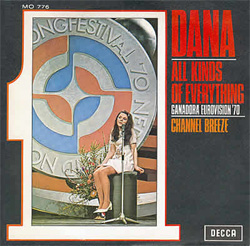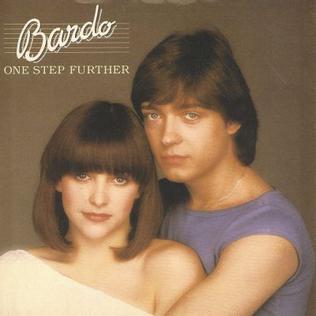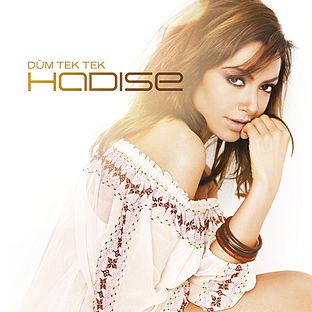
Seán Patrick Michael Sherrard, known professionally as Johnny Logan, is an Irish singer and musician. He is best known for being the first performer to win the Eurovision Song Contest as a lead singer twice.
The United Kingdom held a national pre-selection to choose the song that would go to the Eurovision Song Contest 1967. It was held on 25 February 1967 and presented by Rolf Harris. Harris's weekly show had been the showcase for the five songs in the competition, which had been performed in successive weeks prior to the final. Harris himself would be the BBC's commentator for the final in Vienna.
The United Kingdom competed in the Eurovision Song Contest 1998. In addition, the British Broadcasting Corporation (BBC) was also the host broadcaster and staged the event at the National Indoor Arena in Birmingham on 9 May 1998 after the nation won the competition in 1997 with the song "Love Shine a Light" performed by Katrina and the Waves. The BBC organised a public selection to select its entry for the contest, The Great British Song Contest 1998. Eight songs competed over two rounds, with four songs selected through a radio-broadcast semi-final advancing to the televised final round, held on 15 March 1998, where viewers selected the winning entry through televoting. Imaani received the most votes and was selected to represent the UK in the contest with the song "Where Are You?". Imaani performed 16th at the international contest, and at the close of the voting process the UK finished in second place with 166 points, the nation's 15th second-place finish since its debut.
The United Kingdom competed in the Eurovision Song Contest 1999, held on 29 May 1999 at the International Convention Center in Jerusalem, Israel. The British Broadcasting Corporation (BBC) organised a public selection process to determine its entry for the contest, The Great British Song Contest 1999. Eight songs competed over two rounds, with four songs selected through a radio-broadcast semi-final to advance to the televised final round, held on 7 March 1999, where viewers selected the winning entry through televoting. Girl group Precious received the most votes and were selected to represent the nation in the contest with the song "Say It Again".
The United Kingdom participated in the Eurovision Song Contest 2001 with the song "No Dream Impossible" written by Russ Ballard and Chris Winter. The song was performed by Lindsay Dracass. The British entry for the 2001 contest in Copenhagen, Denmark, was selected via the national final A Song for Europe 2001, organised by the British broadcaster BBC. Eight acts competed in the national final which consisted of a semi-final and a final, during which the winner was selected entirely through a public televote.
The United Kingdom participated in the Eurovision Song Contest 2002 with the song "Come Back" written by Martyn Baylay. The song was performed by Jessica Garlick. The British entry for the 2002 contest in Tallinn, Estonia, was selected via the national final A Song for Europe 2002, organised by the British broadcaster BBC. Eight acts competed in the national final which consisted of a semi-final and a final, during which the winner was selected entirely through a public televote.

"Love Shine a Light" is a song by British rock band Katrina and the Waves. It represented the United Kingdom at the Eurovision Song Contest in 1997. It was released as a single on 28 April 1997 and was later included on the band's ninth studio album, Walk on Water (1997), serving as the album's lead single.

Eurovision: You Decide is the most recent name of a BBC television programme that was broadcast annually to select the United Kingdom's entry for the Eurovision Song Contest. The show had previously gone under several other names, including Festival of British Popular Songs (1957), Eurovision Song Contest British Final (1959–1960), The Great British Song Contest (1996–1999), Eurovision: Making Your Mind Up (2004–2007), Eurovision: Your Decision (2008), and Eurovision: Your Country Needs You (2009–2010), but was known, for most of its history, as A Song for Europe.

"All Kinds of Everything" is a song written by Derry Lindsay and Jackie Smith; as performed by Dana, it won the Eurovision Song Contest 1970 representing Ireland. "All Kinds of Everything" marked a return to the ballad form from the more energetic performances which had dominated Eurovision the previous years. Dana sings about all the things which remind her of her sweetheart with the admission at the end of every verse that "all kinds of everything remind me of you". The recording by Dana became an international hit.

Lindsay Dracass is an English pop music singer.
The Netherlands participated in the Eurovision Song Contest 2005 with the song "My Impossible Dream" written by Robert D. Fisher and Bruce Smith. The song was performed by Glennis Grace. The Dutch broadcaster Nederlandse Omroep Stichting (NOS) organised the national final Nationaal Songfestival 2005 in collaboration with broadcaster Televisie Radio Omroep Stichting (TROS) in order to select the Dutch entry for the 2005 contest in Kyiv, Ukraine. 24 entries competed in the national final which consisted of five shows: four semi-finals and a final. Six entries competed in each semi-final with three advancing: two entries selected based on a public vote and one entry selected by a three-member jury panel. Twelve entries qualified from to compete in the final on 13 February 2005 where "My Impossible Dream" performed by Glennis Grace was selected as the winner following the combination of votes from three jury panels and a public vote.
"I'm Never Giving Up", written and composed by Ron Roker, Jan Pulsford, and Phil Wigger, was the United Kingdom's entry at the Eurovision Song Contest 1983, performed by the trio Sweet Dreams.

"One Step Further", written by Simon Jefferis, was the United Kingdom's entry at the Eurovision Song Contest 1982, performed by the duo Bardo, comprising Sally Ann Triplett and Stephen Fischer.
"Bad Old Days" was the British entry in the Eurovision Song Contest 1978, performed in English by Co-Co.

"Düm Tek Tek" is a song by Belgian-Turkish singer Hadise that was performed as the Turkish entry for the Eurovision Song Contest 2009 in Moscow, Russia.
Ireland participated in the Eurovision Song Contest 1969 in Madrid, Spain. The participating broadcaster, RTÉ, selected the entrant through a national final, which was won by Muriel Day. Joined by the Lindsays, they finished 7th place with 10 points in the final on 29 March 1969.

Molly Alice Smitten-Downes, known by her mononym Molly, is an English singer and songwriter.
Richard and Adam Johnson, performing as Richard & Adam, are Welsh classical singers, best known for finishing in third place on the seventh series of Britain's Got Talent. They come from Holywell in Flintshire, Wales. Their debut album The Impossible Dream topped the UK Albums Chart and spent four consecutive weeks at number one, making it the longest-running number-one album of 2013 in the UK.

Electro Velvet were a British vocal duo that represented the United Kingdom in the Eurovision Song Contest 2015 with the song "Still in Love with You" finishing 24th. The duo consist of Alex Larke and Bianca Nicholas.

"Embers" is a song released by British singer James Newman, on 11 March 2021. It represented the United Kingdom in the Eurovision Song Contest 2021 in Rotterdam, where it came in last place with no points. Described as a dance pop single, the song is about enduring passion, which Newman feels has resonance with the approaching end point of the COVID-19 pandemic.









